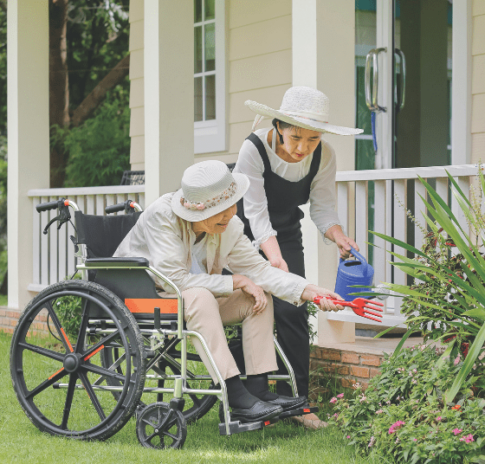If you are a family member who physically cares for someone with a disability, handling personal, caregiving and everyday needs is hard work. It’s important to have the right support – not only to carry out your caregiving tasks, but also to take care of your own needs and responsibilities.
At FirstLight, it’s our mission to assist adults with chronic needs or disabilities, as well as their families. This could be in the form of a professional caregiver to help them live independently, or support and advice for those of you providing their care, to help keep stress at bay.
Becoming a Family Caregiver
Being a family caregiver doesn’t always mean caring for an aging parent or partner. Many of the caregivers we support have family members with autism, Down’s Syndrome, Cerebral Palsy and other intellectual impairments. Caring for developmentally disabled adults comes with similar challenges to caring for someone with a physical impairment, though it may require a slightly different approach.
While caregiving comes with certain rewards – in particular, the active role you have in enhancing their quality of life – but it’s also important to prioritize your own wellbeing.
Providing Disability Home Care for a Loved One
FirstLight supports family caregivers by providing in-home assistance when you need it, as well as advice and guidance on how best to care for disabled adults at home. The following in-home caregiver tips can be extremely helpful when you are the family caregiver:
Educate Yourself. Gather as much information as you can about your family member’s condition. Meet with their health advisors and specialists to understand their current situation and what to expect in the future. Becoming more informed will help you make more knowledgeable health decisions and improve your understanding of any challenges your family might face.
Grow Your Support Group. Family members, friends and neighbors can provide support in a variety of ways and oftentimes want to help, but are not sure how to ask. Determine what you need and be specific about how they can assist. Ways you can utilize your support network include:
- Ask friends, family, healthcare providers and counselors to join your family care team. Ask them for help with housework, providing meals or even with your own errands and chores. They could even take a turn at respite care, so you can take a break sometimes.
- Search for local and national groups that provide services, recreation and information for people with disabilities. For example, if there is a charity or association dedicated to their particular condition, sign up for their newsletters or emails. This will help you stay informed about the latest news, advice, local events and support services, such as companion services for disabled adults in your area.
- You and the disabled loved one should join online support groups based on their needs and interests. A support group can give you the chance to share information and connect with people who are going through similar experiences. A support group may help you overcome any isolation and fear you may experience as a caregiver.
Be an Advocate. A family member with a disability will need advocates to ensure that they receive the best service, support, education and care available. Some of the best ways to do this are:
- Familiarize yourself with the Americans with Disabilities Act, the Family Medical Leave Act, and other state and national provisions. Knowing how and when to apply them to your specific situation could be the best thing you do.
- Keep other caregivers and health providers aware of any special conditions or circumstances that could negatively impact them.
- Keep a current and complete record of their medical history, as well as any relevant certificates or documents. This could include any contracts or agreements with their employer, if applicable.
Remember – Self Care. Caregiving is hard work, and it’s important that you stay healthy for yourself and for those in your care. Here are some suggestions on maintaining your own health and wellbeing:
- Set aside regular time for yourself to read a book, go for a walk, take a nap or to do anything that helps you de-stress.
- Be an advocate for yourself and let your employer know your situation. Be open and discuss what you need to be able to support your loved one, such as flexible hours or the potential to work remotely.
- Take care of your physical health by exercising, eating healthy food and getting enough sleep.
- Don’t neglect your other relationships – make time to see your friends and other family members when you can.
- Don’t be afraid to ask for help. If you don’t have other family members nearby, in-home caregiving providers like those at FirstLight Home Care offer companion or personal care services on a daily or weekly basis. We provide meal preparation, housekeeping, assistance with hygiene and, when needed for family vacations or appointments further afield, travel companions for adults with disabilities.
Ensure the Best Care for Your Loved One With FirstLight
Families and individuals caring for a loved one with a disability play an important role in their life. The care you provide allows them to maintain a sense of independence, remain in their home and be surrounded by the things and people they love. Adding services from a non-medical home care provider such as FirstLight can supplement the care you provide by taking on jobs that are too much or by stepping in whenever you need a break.
To find out how FirstLight Home Care for disabled adults could support the quality of life of your loved one, contact our home care team for a personalized care plan today.
If you would like to receive news, articles, and information like this each week, we encourage you to subscribe to our weekly blog. We’ll deliver it right to your inbox every Thursday!
